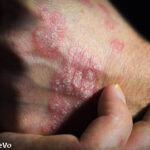NEW YORK (Reuters Health)—Various organizations recommend dozens of screening and monitoring tests for patients with psoriasis or psoriatic arthritis who are using systemic biologic agents, despite sparse evidence to support any of them.
“At a population level, these medications have proven to be very safe and the evidence does not support such extensive and frequent testing in all patients,” Dr. William W. Huang, from Wake Forest School of Medicine, Center for Dermatology Research, Winston-Salem, North Carolina, told Reuters Health by email. “However, every case must be looked at individually based on the patient’s own risk profile.”
Dr. Huang and colleagues reviewed 26 articles in their effort to assess the existing support for screening and monitoring with the use of currently available biologics.
Screening for tuberculosis, preferably using the interferon-gamma release assay (IGRA) instead of tuberculin skin testing, was the only test with strong evidence to support it, and even its evidence was only grade B.
Grade C evidence supports screening for hepatitis B virus (HBV) infection, because of the concern for viral reactivation. Screening for hepatitis C virus (HCV) infection was also supported by grade C evidence. As a result, the researchers wrote, selective screening for HBV or HCV should be based on professional judgment and/or patient preference.
The researchers found insufficient evidence to support screening for HIV infection or to support screening complete blood counts, screening and monitoring antinuclear antibody, or following C-reactive protein levels, according to the July 14 Journal of the American Academy of Dermatology online report.
Grade C evidence supported the monitoring of hepatic function, which may be relevant among patients treated with infliximab.
“Although the evidence does not support current recommendations, provider habits are difficult to change and I do not foresee a change in the near future,” Dr. Huang said.
“Although testing may seem innocuous, there are risks associated with detecting false-positives, leading to additional testing, morbidity, and additional health care cost and resources,” the researchers wrote.
“As both private and public insurance carriers are looking more and more at cost-effective care, we have to examine the level of evidence to support the things we do in medicine,” Dr. Huang concluded.
Dr. Jensen Yeung, from the University of Toronto, Ontario, Canada, told Reuters Health by email, “Testing has already been diminished in psoriasis patients being treated with biologics. We used to perform blood work on patients at least every three months and some ordered a chest x-ray yearly. Many dermatologists are no longer monitoring these patients as frequently.”



